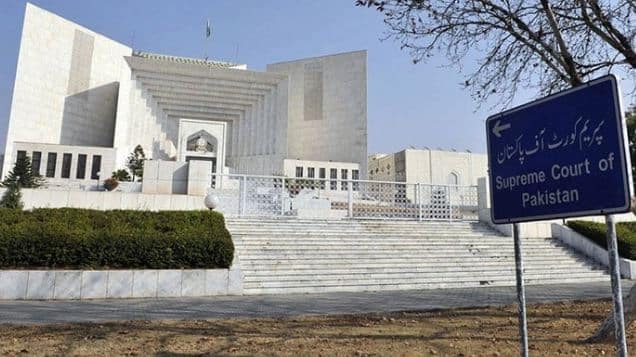NAB amendments case : Blow to Imran Khan as SC rules in favour
Five-member bench sets aside Supreme Court’s last year ruling.
Says order wasn’t in accordance with Practice & Procedure Act.
Court not persuaded that amendments violated the Constitution.
ISLAMABAD: In a major victory for the incumbent government, the Supreme Court on Friday accepted intra-court appeals filed against the September 15, 2023, majority judgement striking down the amendments to the National Accountability Ordinance (NAO).
A larger bench headed by Chief Justice of Pakistan (CJP) Qazi Faiz Isa and comprising Justice Aminuddin, Justice Jamal Khan Mandukhel, Justice Athar Minallah and Justice Hasan Azhar Rizvi announced the unanimous verdict.
Approving the intra-court appeals filed by the federal and provincial governments, the apex court remarked that Pakistan Tehreek-e-Insaf (PTI) founder Imran Khan could not prove that NAB amendments were unconstitutional.
The five-member bench reserved the verdict on June 6 on multiple appeals against the apex court’s September 15 verdict which was announced by then-CJP Umar Ata Bandial.
In the intra-party appeals, the top anti-graft body and the PTI founder were made respondents.
The majority judegment had struck down some amendments made to the National Accountability Ordinance (NAO), 1999.
The amendments — National Accountability (Second Amendment) Act 2022 — were passed in a joint sitting of the parliament in April 2022 during the Pakistan Democratic Movement (PDM)-led government which came into power after ousting ex-premier Khan via a no-trust move in 2022.
It modified sections 2, 4, 5, 6, 25 and 26 of the NAB laws, however, 9 out of 10 amendments were declared “null and void” by the CJP Bandial-led bench on the PTI founder’s petition filed in June 2022.
The order
Referring to the September 15 ruling, the court today pointed out that the Supreme Court (Practice and Procedure) Act, 2023 — which required that a plea must be heard by “not less than five judges of the SC” — was enacted while Khan’s petition was pending adjudication.
The top court noted that the petition challenging the amendments made to the Ordinance was not heard and decided in accordance with the SC (Practice and Procedure) Act — hereinafter referred to as the “Act”.
“If the provisions of the Act had been followed the Petition may have been decided differently [….] These [intra-court] appeals could justifiably be allowed on the ground that since the Petition was not heard and decided as required by the Act by a five-member bench the impugned judgement is coram non-judice and a nullity in law,” it added.
Furthermore, the five-member bench’s judgement today also pointed out that last year’s ruling did not demonstrate how the amendments violated or infringed any of the fundamental rights provisioned under Articles 14, 23 and 25 of the Constitution.
“Petition and the impugned judgement failed to establish that the Amendments were unconstitutional, nor have we been so persuaded in this regard,” the apex court noted, adding that the larger bench wasn’t persuaded by Khan and learned Senior Advocate Khawaja Haris Ahmed that the amendments violated the Constitution.
“We allow these appeals by setting aside the impugned judgement,” reads the SC order.
Restoration of graft cases
In a 2-1 majority verdict announced in September last year, a three-member bench led by then-CJP Bandial had approved Khan’s petition, challenging the NAB law amendments made during the tenure of the previous PDM-led government.
Alongside ex-CJP Bandial, the bench comprising Justice Mansoor Ali Shah and Justice Ijazul Ahsan had held more than 50 hearings on Imran’s petition.
Following the modifications in the anti-corruption watchdog laws, several graft cases against public office holders were closed down, however, the top court’s ruling restored all closed enquiries filed with the NAB.
The apex court ordered restoring all graft cases worth less than Rs500 million that were closed down against the political leaders belonging to different political parties and public office holders and declared the amendments void.
Furthermore, the court directed the NAB to return all records related to cases to relevant courts within seven days.
Larger bench formed after intra-court appeals
Subsequently, the federal government, filed an intra-court appeal against the SC September 15 judgement in October 2023, stating that the majority judgement suffers from procedural impropriety and is, therefore, liable to be set aside.
The apex court had constituted a five-member larger bench headed by CJP Isa on May 10, 2024, to hear the appeals and also granted permission to jailed ex-PM Imran to attend the hearings via video link to present his arguments.
After taking up the intra-court appeals, the Supreme Court in November last year barred the accountability courts from giving final verdicts in corruption cases that have been reopened after the nullification of the said NAB ordinance.
NAB amendments
Under the amendments, the NAB was restricted to investigate into any graft case worth less than Rs500 million besides curtailing the accountability body’s powers to probe into a fraud case unless its victims are more than 100.
It also modified the NAB law to keep an accused in its custody for a maximum of 14 days which was later exceeded to 30 days.
Moreover, the amendments barred the anti-corruption watchdog from taking action on federal, provincial or local tax-related matters.
Additionally, regulatory bodies operating in the country were removed from the NAB purview under the amendments besides transferring the pending interrogations, investigations, and trials against individuals or financial matters to relevant institutions and courts.
The changes to the law included reduction of four-year term of the NAB chairman and the bureau’s prosecutor general to three years. Moreover, it also set a three-year term for the judges of the accountability courts and that courts be bound to decide a case within one year.

